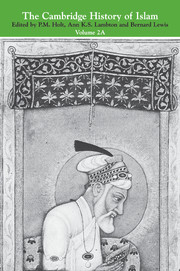Book contents
3 - SOUTH-EAST ASIAN ISLAM IN THE TWENTIETH CENTURY
from Part VI - SOUTH-EAST ASIA
Published online by Cambridge University Press: 28 March 2008
Summary
The nineteenth century had witnessed repeated and powerful commotion among the major Muslim communities in island South East Asia, especially in the Netherlands possessions. At considerable human and financial cost, the Dutch succeeded in defeating Muslim rebelliousness in the field. Pacification was followed by the implementation, at the end of the century, of a circumspect Islamic policy. Though Wahhābī-inspired Muslim ‘puritanism’ was to leave lasting marks in many parts of Indonesia—most notably, perhaps, in the gradual gains of orthodoxy at the expense of the mystical tarīqas—Islamic militancy in Indonesia had to all intents and purposes given way to relative stability and tranquillity in the opening years of the new century. But this tranquillity was short-lived and soon gave way to a virtual religious, social and political renaissance embracing many parts of the area. The impetus for this Islamic renaissance came, as so often before, from abroad; what lent it viability and a measure of cohesion were social changes resulting from accelerated modernization under colonial rule.
The sources as well as the development of South-East Asia's Islamic renaissance were varied. For one thing, the Pilgrimage continued to attract increasing numbers of South-East Asians. Thus in 1911, Dutch statistics recorded over 24,000 Indonesians, comprising almost thirty per cent of all overseas pilgrims in the Holy City. Ibn Su‘ūd's conquest of Mecca in 1924 and the subsequent Pax Wahhabica—coinciding with temporary prosperity in the Indies—led to a dramatic augmentation in the number of pilgrims, culminating in over 52,000 Indonesians (over forty per cent of the overseas total) in 1926–7.
- Type
- Chapter
- Information
- The Cambridge History of Islam , pp. 182 - 208Publisher: Cambridge University PressPrint publication year: 1977

